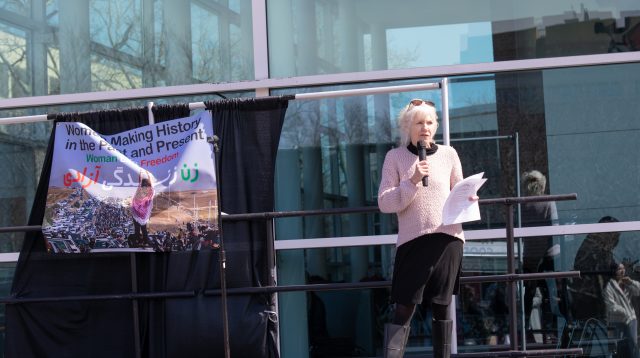
The Iranian Graduate Student Association (IGSA) collaborated with the Department of History to host an event chronicling the history of feminism in Iran and demonstrate support and solidarity for Iranian women.
On Wednesday, March 22, the event took place in the Student Activities Center plaza with about 30 attendees, including students, Iranian community organizers and representatives and faculty.
Traditional Iranian snacks and tea were offered to participants, and Nowruz Mubarak, or Persian New Year, displays were decorated with flowers, a mirror and more, with accompanying documents explaining the significance of each object.
Four signs behind these tables showcased the achievements of Iranian women such as chess player Sara Khadem, and other important topics in Iranian history including the revolution taking place in Iran, systemic oppression within the Global South and a general history of feminism within Iran from 1848 to today.
“Everything was greatly organized, and the signs were very informative,” Ruth Zhang, a freshman biology major, said. “I felt like I learned a lot.”
The event began with an IGSA member stating that the organization wanted to share their culture with the students of Stony Brook University while also raising awareness of the oppression women face in Iran.
“Raise your voice and stand in solidarity with Iranian women,” the IGSA member told the audience.
Susan Hinely, visiting scholar of the history department, was invited to the stage to discuss women’s history in Iran. She discussed how, in 1848, influential Iranian women’s rights activist and poet Táhirih led a revolution.
“Táhirih was arrested for her actions, but before being executed by drowning she reportedly claimed, ‘You can kill me as soon as you like, but you cannot stop the emancipation of women,’” Hinely said.
The Seneca Falls convention held in 1848 by British suffragists also coincided with the revolution held by Iranian feminists in that same year, with neither group being aware of each other.
Decades later, female suffragists interpreted this as “a cosmic confirmation of the worldwide movement for women’s emancipation,” Hinely said.
Táhirih’s poem “Look up!” was then read in both Persian and English by Kelcie Eberharth, a member of the IGSA and president of the History Club.
“The search for truth shall drive out ignorance. Equality shall strike the despots low … let justice everywhere its carpet throw,” Eberharth read.
Former senator of New York, Anna Kaplan, was also invited to speak about the importance of supporting Iranian women. Kaplan was the first Iranian-American elected to the New York State Senate, and a child refugee from Iran.
“When we see our rights being attacked anywhere else in the world, it is really incumbent upon all of us, wherever we are, to stand in solidarity,” Kaplan said.
Kaplan also said that there is a part that everyone must play in helping not just Iranian women, but all women to move forward in society and “continue to expand.”
She finished by affirming her support of women in Iran, stating, “We see them. We hear them. We stand with them.”
Hinely then came back to the stage to continue discussing women’s history, moving forward to the year 1905, when the Constitutional Revolution began. The movement started after women were taken throughout Iran to be sold into human trafficking.
“Just as today in ‘Woman, Life, Freedom,’ an act against the body of a woman crystallizes and sparks a revolution,” Hinely said.

Hinely further described how women took up armed resistance against not only the ruling dynasty, the Qajar regime, but also imperial interference from Britain and Russia. Women also played a fundamental role in forming the new National Bank and boycotting foreign products.
According to Hinely, Iranian women therefore became symbols of freedom and power within women’s suffrage movements across the world. “The International Women’s Suffrage Alliance chooses Táhirih as their symbol of what women can be.”
Betty Emamian, one of the leaders of the annual Persian Parade and a community organizer, then came to the stage to explain the celebration of Nowruz Mubarak and raise awareness of the Iranian revolution.
“We are celebrating in a subdued way because, with the Iran revolution and ‘Woman, Life, Freedom,’ it’s been a challenging few months in our motherland Iran,” Emamian said. “It’s our job as women of any ethnicity to be their voice, and not let their movement quiet down because of the fears that they’re facing right now back home.”
Iranian student Kayla Yousefzadeh read to the audience some of the restrictions imposed on women by the state, which included the legal age of marriage for women being lowered from 18 to 13.
“Married women need their husband’s permission to travel outside of Iran,” Yousefzadeh said. “Women can only get a divorce in court, while men can simply get a divorce by declaring it.”
Graduate student Francisco Rodriguez from Chile also spoke of the connections found between Chile and Iran in terms of state oppression and women’s struggles for rights.
“Feminist movements in Latin America have fought systematically against state repression until today, and that’s something I think we have in common,” Rodriguez said.
Rodriguez spoke about how feminism is a global struggle and impacts women from across the globe, but particularly in the global South, where countries such as Iran and Chile were ruled or currently ruled by absolute states.
The event was closed by Eberharth, who read some of the Bill of Rights drafted primarily by Iranian women in exile in hopes that when the Islamic fundamentalist rule ends, the next constitution will include freedom for women.
When asked what students can do, Eberbarth said, “Your voice is so powerful, and reaching out to local representatives and asking what they’re doing and what you can be doing, that’s so crucial, and you have the power to make the change.”
According to the United Nations Human Rights Office, over 16,000 girls between the ages of 10 and 14 have been married in the first half of this Iranian calendar year. Iran is also one of the only countries to have not signed the Convention on the Elimination of All Forms of Discrimination Against Women.
The Human Rights Watch also states that some employers require written consent from women’s husbands and fiancés in order to hire them, and distribution of contraceptives in the public health care system is outlawed.
The movement of “Woman, Life, Freedom” remains alive largely through social media and will continue to fight for women’s liberation in Iran.
















